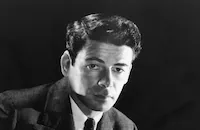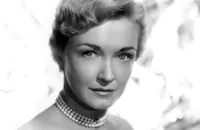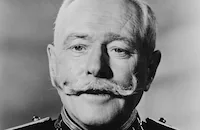A Song to Remember

Brief Synopsis
Cast & Crew
Charles Vidor
Paul Muni
Merle Oberon
Cornel Wilde
Nina Foch
George Coulouris
Film Details
Technical Specs

Synopsis
In the early nineteenth century in Warsaw, Poland, music teacher Professor Joseph Elsner receives a letter from Louis Pleyel, a celebrated Parisian music publisher and impresario, offering to audition the professor's pupil, child prodigy Frédéric Chopin. The Chopin family is poor, however, and consequently, cannot afford their son's passage to Paris. When the eleven-year-old Chopin becomes preoccupied with his country's struggle for freedom against the Russian Czarists, the professor inspires the boy by telling him that his fame as a pianist will pave the way for Polish freedom. Eleven years later, Chopin is summoned to play at a concert for a count. When the Russian Governor General of Poland unexpectedly appears at the concert, Chopin denounces him as "a Czarist butcher" and storms out of the room. His life endangered by the outburst, Chopin is forced to flee Poland, and the professor suggests taking refuge in Paris. As the professor and Chopin prepare to depart, Constantia, one of Chopin's comrades, presents him with a pouch of Polish soil. In Paris, the professor takes his protege to see Pleyet, but the impresario is only interested in Chopin, the child prodigy, not Chopin, the grown man. As Pleyel and the professor argue, composer Franz Liszt sits down at the piano and begins to play Chopin's unfinished composition, a Polanaise. When Chopin joins Liszt in a duet, Pleyel recognizes the composer's genius and offers him a concert appearance. To celebrate his pupil's success, the professor takes him to a famous café frequented by artists. There, Liszt introduces them to the poet Alfred de Musset and the novelist Georges Sand, who is garbed in men's attire. On the night of Chopin's concert debut, word arrives from Poland that two of the composer's friends have been executed for aiding his escape. Deeply troubled, Chopin fumbles his piece on the keyboard and runs off the stage. Despite the devastating reviews of his performance, Georges proclaims that Chopin is a true genius. Determined to prove her hunch, Georges invites Chopin to attend Liszt's performance at the Duchess of Orlean's salon. When Liszt requests that the room be darkened, Chopin uses the cover of blackness to take his place at the piano. After Georges enters the room carrying a candelabra and illuminates Chopin's presence, the audience erupts in applause. After the concert that night, Georges convinces Chopin to leave for her country estate before signing contracts with Pleyel. Although the professor objects, Chopin is enamoured by Georges and ignores his old friend's advice. At her country estate, Georges talks Chopin into joining her on the island of Majorca, arguing that his only allegiance should be to composing. As Chopin and Georges isolate themselves on Majorca, the professor loyally awaits his pupil's return to Paris. Evicted for non-payment of rent, he moves to humble lodgings and begins to teach again. When the dank climate of Majorca causes Chopin's fragile health to deteriorate, the composer asks Georges to go back to France with him. Upon learning of Chopin's homecoming, the professor hurries to Georges's country house where he argues with her about what is best for Chopin. Georges jealousy guards Chopin, and as a result, the professor leaves without seeing his protege. When Liszt encounters the dejected professor on a Paris street one day, he invites him to attend a salon at which Chopin will be playing. As news of the suppression of the Polish uprising sweeps the country, Constantia visits the professor to ask his help in enlisting Chopin in their cause. Reluctantly agreeing to approach Chopin, the professor attends the salon. Upset by his teacher's presence, Chopin leaves the room and is followed by the professor. When the professor mentions the uprising in Poland, Georges insists that Chopin's only obligation is to his own genius. Retorting that genius should serve mankind, the professor throws down the pouch of Polish soil and departs. Aroused by his teacher's words, Chopin decides to undertake a grueling concert tour of European capitals, the proceeds of which are to be donated to Polish resistance. Angrily denouncing Chopin's decision as certain suicide, Georges severs their friendship. Driven by patriotism, the frail Chopin embarks upon a whirlwind tour and collapses in Paris after completing his final concert. When Georges refuses to visit Chopin on his deathbed, the composer expires in the presence of his two longtime friends, the professor and Constantia.

Director

Charles Vidor
Cast

Paul Muni

Merle Oberon

Cornel Wilde

Nina Foch

George Coulouris

Howard Freeman
Stephen Bekassy

Sig Arno

George Macready
Claire Dubrey

Frank Puglia

Fern Emmett
Sybil Merritt
Ivan Triesault

Fay Helm
Dawn Bender
Maurice Tauzin
Roxy Roth
Peter Cusanelli
William Challee
William Richardson
Alfred Paix
Charles Wagenheim
Paul Zaremba
Charles Latorre
Earl Easton

Gregory Gaye
Walter Bonn
Henry Sharp
Zoia Karabanova
Michael Visaroff

John George

Ian Wolfe
Lucy Von Boden
Norma Drury
Alfred Allegro
Cosmo Sardo
Al Luttringer
Eugene Borden

Darren Mcgavin
Crew
Victor Allen
Lionel Banks
Travis Banton
Ludwig Van Beethoven
Abby Berlin
Fayte M. Brown
Sidney Buchman
Sidney Buchman
Clay Campbell
Shura Cherassky
Frédéric Chopin
Lodge Cunningham
Allen M. Davey
Louis F. Edelman
Tony Gaudio
Gene Havlick
Helen Hunt
José Iturbi
Natalie Kalmus
Ernst Marischka
Charles Nelson
Walter Plunkett
Van Nest Polglase
William Randall
Miklos Rozsa
Mario Silva
M. W. Stoloff
Frank [a.] Tuttle
William Watts

Videos
Movie Clip


Hosted Intro
Film Details
Technical Specs

Award Nominations
Best Actor
Best Cinematography
Best Editing
Best Score
Best Sound
Best Writing, Screenplay
Articles
A Song to Remember
Reviewers at the time commented that, even by Hollywood standards, the film was riddled with historical inaccuracies too numerous to pick apart here. However, it was expected that with Paul Muni cast in the role of Elsner, his importance to Chopin would be elevated (in truth, the respected teacher and composer of "Stabat Mater" never went to Paris with Chopin). A respected actor for several decades on both stage and screen, Muni received top billing for a role that was highly inflated, first by the film's producers and then by Muni himself; he hammed it up so ferociously in the part that reviewers noted he appeared to be in an entirely different picture from the rest of the cast. (Reportedly he developed his character and performance in advance of filming and refused to allow either the director or the performances of the other actors to affect it.) But Muni could be forgiven for being a little grand. His style had been well rewarded many times in his career with glowing reviews and the accolades of his peers in the Academy. Up to this point, he had been Oscar® nominated five times and took home the Best Actor award once, for The Story of Louis Pasteur (1935). He was one of only a handful of actors (along with Orson Welles, James Dean and a few others) to be nominated for his film debut (The Valiant, 1929), and he was nominated once more for his final screen appearance in The Last Angry Man (1959).
The handsome, robust Cornel Wilde was an odd choice to play the frail, sickly Chopin, but his work here was impressive enough to earn him an Academy Award as Best Actor. A supporting player for about a decade prior to this, his performance here made him a star. But the young actor received no support or respect from Muni, apparently disgruntled that his friend Glenn Ford could not play the role because he volunteered for the Marine Corps instead.
In spite of the story's inaccuracies and Muni's wildly theatrical performance, the picture was a hit and racked up five other Academy Award nominations: Cinematography, Editing, Music Scoring, Sound Recording, and Original Story. Critics and audiences alike thrilled to Chopin's music, played by noted pianist Jose Iturbi (who was unbilled because he was under contract to another studio) and well adapted by film composer Miklos Rozsa. The picture exposed large numbers of Americans to Chopin's work for the first time, and his "Polonaise" (unfinished at the time of his death) became a hit recording, first in instrumental form by Iturbi and later set to lyrics, recorded by Perry Como as "Till the End of Time." The song was so popular, it was used as the title of a 1946 film about returning World War II soldiers starring Robert Mitchum and Guy Madison.
Chopin has been portrayed on screen numerous times, mostly in films made outside the U.S., and with varying degrees of faithfulness to the real facts. One of the most notable depictions was in James Lapine's Impromptu (1991), a film about George Sand (Judy Davis), with Hugh Grant giving a more convincing performance as the frail Polish composer. Academy Award-winner George Chakiris (West Side Story, 1961) played Chopin in a 1974 BBC mini-series about Sand, Notorious Woman, which featured Rosemary Harris in the title role. The French author has also been portrayed in Diane Kurys' Les Enfants du Siecle (1999) by Oscar®-winner Juliette Binoche (The English Patient.
A Song to Remember features a number of other real-life characters who would likely not recognize themselves on screen, including Franz Liszt, Balzac, and Paganini. Liszt's life has also been the basis for several films, among them Ken Russell's Lisztomania (1975), in which Roger Daltrey played the composer as a 19th century rock star. Director Charles Vidor hoped to follow the success of A Song to Remember with the similarly titled Liszt biopic Song Without End (1960) with Dirk Bogarde as the composer. Vidor did not live to see the completion of that production (finished by an uncredited George Cukor), and the movie, although a Golden Globe winner for Best Picture, Musical or Comedy, did not click with audiences. Morris Stoloff, who was Oscar®-nominated (along with Miklos Rozsa) for adapting Chopin's music for A Song to Remember, won an Academy Award (along with Harry Sukman) for doing the same fine work with Liszt's music on the latter picture.
Director: Charles Vidor
Producer: Sidney Buchman, Louis F. Edelman
Screenplay: Sidney Buchman, based on a story by Ernst Marischka
Cinematography: Allen M. Davey, Tony Gaudio
Editing: Charles Nelson
Art Direction: Lionel Banks, Van Nest Polglase
Original Music: Miklos Rozsa, Morris Stoloff, Buddy Kaye and Ted Mossman (song "Till the End of Time")
Cast: Cornel Wilde (Frederic Chopin), Paul Muni (Prof. Elsner), Merle Oberon (George Sand), Stephen Bekassy (Franz Liszt), Nina Foch (Constantia).
C-113m.
by Rob Nixon

A Song to Remember
Quotes
Discontinue that so-called Polonaise jumble you've been playing for days.- George Sand
Trivia
Notes
The working titles of this picture were The Song That Lived Forever, At Night We Dream, Chopin, The Love of Madame Sand and Forever and Ever. Several reviews charged the film with being "perversely inaccurate in depicting Chopin's life." In reality, Chopin (1810-1849) was the progeny of a Polish mother of noble birth and a French-born salesman father, and not the offspring of Polish peasants as the film depicts. Chopin's first published work appeared when he was fifteen years old and by the time he graduated from the lyceum at seventeen, he was recognized as a talented composer and the leading pianist of Warsaw. Chopin had performed two successful concerts in Vienna before deciding to leave for Warsaw after the city was placed under harsh Russian military rule. Consequently, Chopin arrived in Paris as an acclaimed pianist rather than the unrecognized student of Joseph Elsner as presented in the film.
Although onscreen credits state that the screenplay was adapted from a story by Ernst Marischka, a letter contained in film's production files at the AMPAS Library, written by the assistant secretary of the Screen Writer's Guild, claims that "the information submitted to the guild indicates the story was derived from a French picture about Frédéric Chopin that was screened years earlier in Europe but never released in the United States." This claim has not been substantiated, however. Although a 1927 French film titled La Valse depicted the life of George Sand and Chopin, it is not known if that is the film referred to by the Guild's letter. A modern source claims that the film was derived from the book Polonaise by Doris Leslie. Although the Variety review credits Lodge Cunningham as music director, Cunningham actually served as sound director on the film.
Plans for the project were announced as early as 1938. According to a January 1938 news item in Hollywood Reporter, Frank Capra was initially slated to direct this picture. Hollywood Reporter news items note that in March 1946, Capra sued Columbia for a share of the film's profits, claiming that he had prepared the story for the studio and therefore was entitled to a 25% return. In September 1946, a judge ruled in Capra's favor by denying a motion made by the studio to dismiss Capra's complaint. In October 1938, Marlene Dietrich was announced in Hollywood Reporter for the role of "Georges Sand." A Hollywood Reporter production chart adds Joan Frank to the cast, but her appearance in the released film has not been confirmed. Although Gene Havlick is listed in a Hollywood Reporter production chart as editor, Charles Nelson is credited onscreen in that capacity. According to a news item in Time, José Iturbi, the renowned concert pianist who dubbed Cornel Wilde's playing, could not be officially credited on the film because he was under contract to M-G-M. In a Saturday Evening Post interview, Wilde stated that concert pianist Victor Allen tutored him for four months so that he could play the piano silently on the set. According to a February 1945 article in Down Beat, the hands of pianist Shura Cherkassky were substituted for those of Wilde in the scenes where only Wilde's hands were shown playing at the keyboard. The music however, was played by Iturbi. Wilde, who was borrowed from Twentieth Century-Fox to appear in this picture, claimed that Columbia initially opposed casting him as "Chopin" because the studio felt he was too athletic for the part.
A Song to Remember was producer Louis Edelman's last picture for Columbia. It also marked the screen debut of Darren McGavin (1922-2006). To promote the film, the studio established a "George Sand Memorial Talent Search." This picture was sold on a percentage basis separate from Columbia's regular program, marking the first time that this practice was instituted by the studio, according to a Hollywood Reporter news item . The film was nominated for an Academy Award for Best Actor, Best Color Cinematography, Best Original Story, Best Sound Recording, Best Film Editing and Best Score. Other films based on the lives of Sand, Chopin and Franz Liszt include the 1960 film Song Without End, starring Patricia Morison and Dirk Bogarde and directed by Charles Vidor and George Cukor; the 1975 BBC television series Notorious Woman, starring Rosemary Harris; and the 1991 film Impromptu, directed by James Lapine and starring Hugh Grant, Judy Davis, Bernadette Peters and Mandy Patinkin.

Miscellaneous Notes
Released in United States Spring March 1, 1945
Released in United States Spring March 1, 1945














